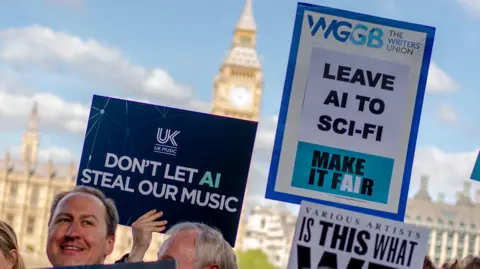 PA Media
PA MediaThe fierce battle over synthetic intelligence (AI) and copyright – which pits the federal government towards among the largest names within the inventive trade – returns to the Home of Lords on Monday with little signal of an answer in sight.
An enormous row has kicked off between ministers and friends who again the artists, and reveals no signal of abating.
It could be about AI however at its coronary heart are very human points: jobs and creativity.
It is extremely uncommon that neither aspect has backed down by now or proven any signal of compromise; in actual fact if something help for these opposing the federal government is rising slightly than tailing off.
That is “unchartered territory”, one supply within the friends’ camp instructed me.
The argument is over how finest to steadiness the calls for of two large industries: the tech and artistic sectors.
Extra particularly, it is in regards to the fairest approach to permit AI builders entry to inventive content material with a purpose to make higher AI instruments – with out undermining the livelihoods of the individuals who make that content material within the first place.
What’s sparked it’s the uninspiringly-titled Information (Use and Entry) Invoice.
This proposed laws was broadly anticipated to complete its lengthy journey by way of parliament this week and sail off into the regulation books.
As a substitute, it’s presently caught in limbo, ping-ponging between the Home of Lords and the Home of Commons.
A authorities session proposes AI builders ought to have entry to all content material until its particular person homeowners select to decide out.
However practically 300 members of the Home of Lords disagree with the invoice in its present kind.
They assume AI corporations must be compelled to reveal which copyrighted materials they use to coach their instruments, with a view to licensing it.
Sir Nick Clegg, former president of worldwide affairs at Meta, is amongst these broadly supportive of the invoice, arguing that asking permission from all copyright holders would “kill the AI trade on this nation”.
These towards embrace Baroness Beeban Kidron, a crossbench peer and former movie director, finest identified for making movies resembling Bridget Jones: The Fringe of Purpose.
She says ministers could be “knowingly throwing UK designers, artists, authors, musicians, media and nascent AI corporations underneath the bus” if they do not transfer to guard their output from what she describes as “state sanctioned theft” from a UK trade price £124bn.
She’s asking for an amendment to the bill which incorporates Know-how Secretary Peter Kyle giving a report back to the Home of Commons in regards to the impression of the brand new regulation on the inventive industries, three months after it comes into power, if it does not change.
 Getty Photographs
Getty PhotographsMr Kyle additionally seems to have modified his views about UK copyright regulation.
He mentioned copyright regulation was as soon as “very sure”, however is now “not match for goal”.
Maybe to an extent each these issues are true.
The Division for Science, Innovation and Know-how say that they are finishing up a wider session on these points and won’t take into account adjustments to the Invoice until they’re utterly glad that they work for creators.
If the “ping pong” between the 2 Homes continues, there is a small likelihood your complete invoice could possibly be shelved; I am instructed it is unlikely however not unimaginable.
If it does, another essential parts would associate with it, just because they’re a part of the identical invoice.
It additionally consists of proposed guidelines on the rights of bereaved dad and mom to entry their kids’s information in the event that they die, adjustments to permit NHS trusts to share affected person information extra simply, and even a 3D underground map of the UK’s pipes and cables, aimed toward enhancing the effectivity of roadworks (I instructed you it was an enormous invoice).
There is no such thing as a simple reply.
How did we get right here?
This is how it began.
Initially, earlier than AI exploded into our lives, AI builders scraped monumental portions of content material from the web, arguing that it was within the public area already and due to this fact freely accessible.
We’re speaking about massive, primarily US, tech corporations right here doing the scraping, and never paying for something they hoovered up.
Then, they used that information to coach the identical AI instruments now utilized by tens of millions to write down copy, create photos and movies in seconds.
These instruments also can mimic fashionable musicians, writers, artists.
For instance, a latest viral pattern noticed folks merrily sharing AI photographs generated within the type of the Japanese animation agency Studio Ghibli.
The founding father of that studio in the meantime, had as soon as described the usage of AI in animation as “an insult to life itself”. Evidently, he was not a fan.
There was an enormous backlash from many content material creators and homeowners together with family names like Sir Elton John, Sir Paul McCartney and Dua Lipa.
They’ve argued that taking their work on this means, with out consent, credit score or fee, amounted to theft. And that artists are actually shedding work as a result of AI instruments can churn out related content material freely and shortly as a substitute.
Sir Elton John did not maintain again in a recent interview with the BBC’s Laura Kuenssberg.
He argued that the federal government was on the right track to “rob younger folks of their legacy and their earnings”, and described the present administration as “absolute losers”.
Others although level out that materials made by the likes of Sir Elton is out there worldwide.
And if you happen to make it too arduous for AI corporations to entry it within the UK they’re going to merely do it elsewhere as a substitute, taking a lot wanted funding and job alternatives with them.
Two opposing positions, no apparent compromise.




